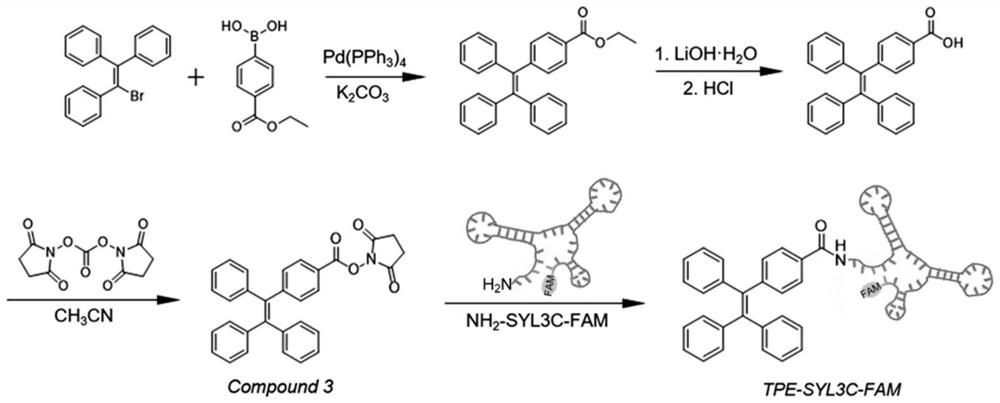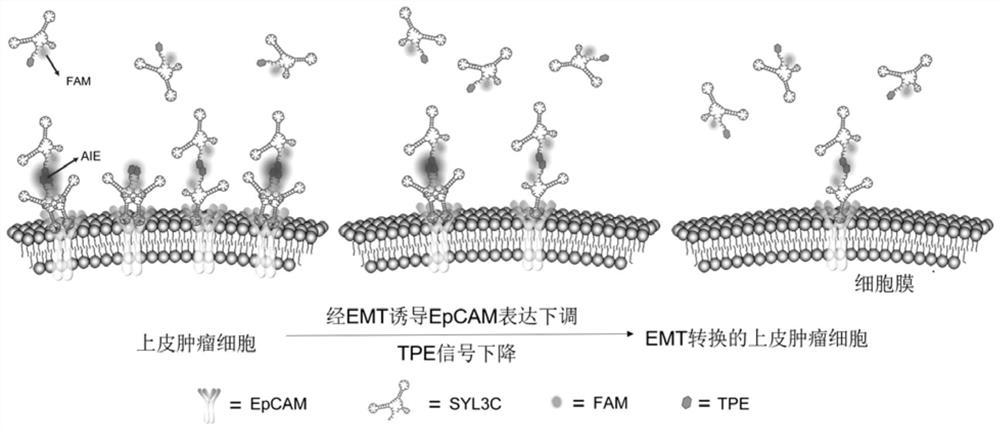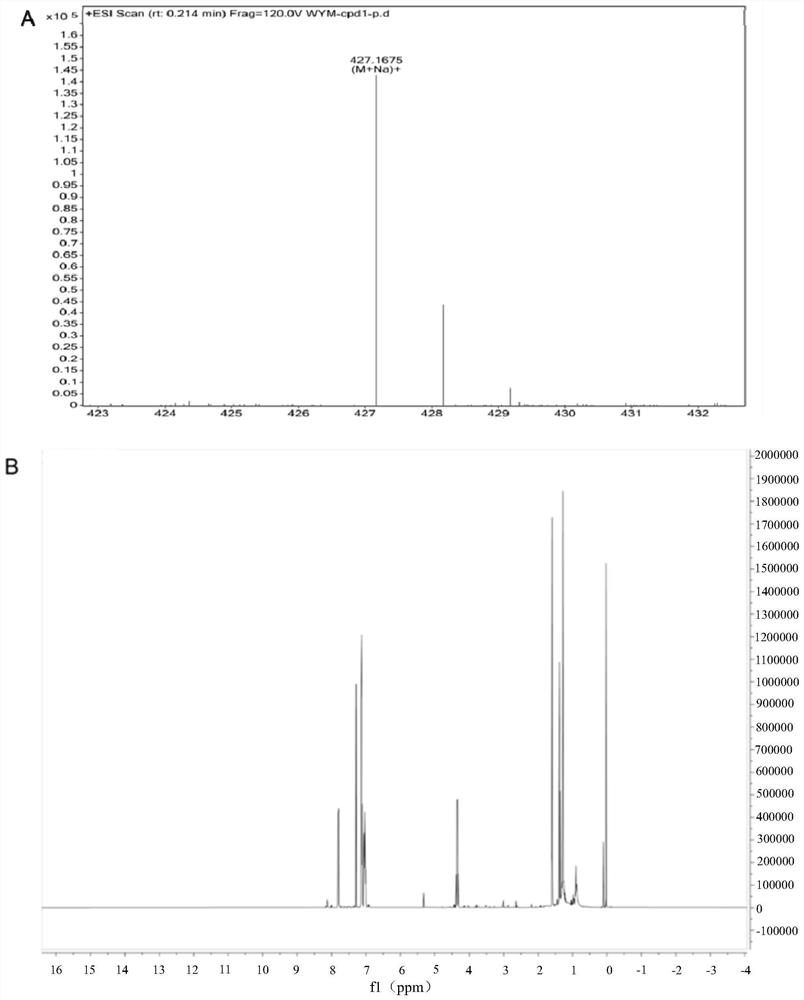Screening probe of medicine for inducing tumor cell epithelial-mesenchymal transition as well as preparation method and application of screening probe
A technology of tumor cells and drugs, applied in the field of medicine, can solve problems such as inability to obtain intuitively
- Summary
- Abstract
- Description
- Claims
- Application Information
AI Technical Summary
Problems solved by technology
Method used
Image
Examples
Embodiment 1
[0067] The preparation method of the screening probe TPE-SYL3C-FAM for inducing tumor cell epithelial-mesenchymal transition drugs is as follows: figure 1 ,Proceed as follows:
[0068] Step (1), triphenylbromoethylene (700mg), 4-ethoxycarbonylphenylboronic acid (450mg), potassium carbonate (3.6g), tetrakis (triphenylphosphine) palladium (120mg) and tetra-n-octyl bromide Ammonium (100mg) was dissolved in toluene-ethanol-water (4:1:1, v:v:v) mixed solvent (60mL), heated to reflux at 90°C for 12h under nitrogen protection, extracted 3 times with 40mL dichloromethane, combined The dichloromethane phase was purified by flash column chromatography after rotary evaporation (eluent was petroleum ether:dichloromethane=1:4, v:v) to obtain 4-(1,2,2-triphenylvinyl) Ethyl benzoate (yield 86.1%); image 3 It is the structural characterization result of ethyl 4-(1,2,2-triphenylvinyl)benzoate, [M+Na] + Precise molecular weight theoretical value m / z 427.1674, measured value m / z 427.1675, m...
Embodiment 2
[0094] Step (1), triphenylbromoethylene (700mg), 4-ethoxycarbonylphenylboronic acid (700mg), potassium carbonate (5.4g), tetrakis (triphenylphosphine) palladium (120mg) and tetra-n-octyl bromide Ammonium (100mg) was dissolved in toluene-ethanol-water (5:1:1, v:v:v) mixed solvent (60mL), heated to reflux at 100°C for 24h under nitrogen protection, extracted 3 times with dichloromethane, and passed through rapid Purified by column chromatography (eluent: petroleum ether:dichloromethane=1:4, v:v) to obtain ethyl 4-(1,2,2-triphenylvinyl)benzoate.
[0095] Step (2), 4-(1,2,2-triphenylvinyl)ethyl benzoate (400mg), lithium hydroxide monohydrate (1.89g), water (30mL) were dissolved in tetrahydrofuran (30mL), Heating to reflux at 100°C for 24 h under nitrogen protection; cooling the reaction solution to room temperature, adjusting the pH of the reaction solution to 4.0 with 1M HCl, extracting with dichloromethane three times, and purifying by flash column chromatography (eluent: ethyl ...
Embodiment 3
[0099] Step (1), triphenylbromide (700mg), 4-ethoxycarbonylphenylboronic acid (900mg), potassium carbonate (5g), tetrakis (triphenylphosphine) palladium (240mg) and tetra-n-octyl ammonium bromide (200mg) dissolved in a mixed solvent (60mL) of toluene-ethanol-water (4:1:1, v:v:v), heated to reflux at 120°C for 48h under nitrogen protection, extracted 3 times with dichloromethane, and passed Purified by column chromatography (eluent is petroleum ether:dichloromethane=1:4, v:v) to obtain ethyl 4-(1,2,2-triphenylethenyl)benzoate;
[0100] Step (2), 4-(1,2,2-triphenylvinyl)ethyl benzoate (400mg), lithium hydroxide monohydrate (2.52g), water (40mL) were dissolved in tetrahydrofuran (40mL), Heated to reflux at 120°C for 48 h under nitrogen protection, cooled the reaction solution to room temperature, adjusted the pH of the reaction solution to 4.0 with 1M HCl, extracted 3 times with dichloromethane, and purified by flash column chromatography (eluent: ethyl acetate:petroleum ether =...
PUM
 Login to View More
Login to View More Abstract
Description
Claims
Application Information
 Login to View More
Login to View More - Generate Ideas
- Intellectual Property
- Life Sciences
- Materials
- Tech Scout
- Unparalleled Data Quality
- Higher Quality Content
- 60% Fewer Hallucinations
Browse by: Latest US Patents, China's latest patents, Technical Efficacy Thesaurus, Application Domain, Technology Topic, Popular Technical Reports.
© 2025 PatSnap. All rights reserved.Legal|Privacy policy|Modern Slavery Act Transparency Statement|Sitemap|About US| Contact US: help@patsnap.com



